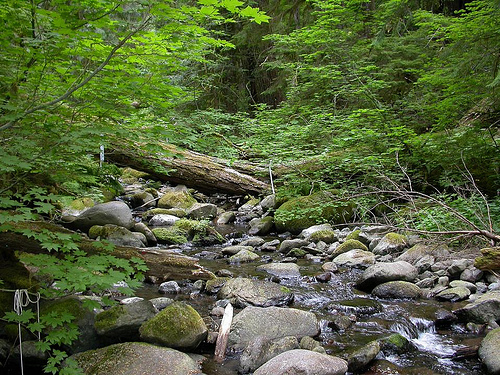A Paradox: Cooling Streams in a Warming Climate?

A recent study by the USDA Forest Service, Oregon State University, and the U.S. Geological Survey identified trends in stream temperatures at sites like Mack Creek near the H.J. Andrews Experimental Forest in Oregon.
This post is part of the Science Tuesday feature series on the USDA blog. Check back each week as we showcase stories and news from USDA’s rich science and research portfolio.
Recent warming of terrestrial climates combined with decreased stream flows has raised concerns about possible increases in stream temperatures in the Pacific continental United States. Loss of cold, clean water in the region has major implications for human use and for sensitive coldwater fishes, such as salmon and trout. In a joint project, the U.S. Geological Survey (USGS), U.S. Forest Service’s Pacific Northwest Research (PNW) Station, and Oregon State University (OSU) researchers assessed the climate effects on cold water in low and high human-influenced sites using long-term stream temperature data from the USGS and the Forest Service.
Trends in stream temperatures at these sites were locally variable and often did not conform to simple expectations based on hypothesized climate effects. Analysis of 1987-2009 stream data revealed fewer warming trends and surprisingly more cooling trends in stream temperatures. To understand historical and predict future climate effects, the authors suggest the need for more extensive sensor networks to track stream temperatures over broader geographic areas and for longer time periods. The study was recently published in the Geophysical Research Letters by the American Geophysical Union.
The study co-leads are OSU’s Ivan Arismendi and PNW Research Station’s Sherri Johnson. To read the report, click here.

So, the basic message by trained scientists is if the data doesn’t fit what they beleive to be true (that since they beleive the climate is getting warmer that streams must be getting warmer), the answer must be to go get more data until the beleif is proven true? Is this what passes for science? Even if the climate has warmed a little (most data suggests 2F degrees in the last century, mostly in urban areas), why would rural streams have to be warmer? Can’t the data just be data and analyzed as such? It appears that the experimental method still takes a back seat to some sort of idealistic Greek philosphy about man’s ability to reason. Anyone check on the latest data coming out on the Greek economy lately? From what I beleive it is doing well, but we just need a more extensive sensor network to detect all the postive economic activity over a broader geographic area and for a longer time period.
I’d be interested to see what future studies could show. Perhaps increased temperatures means more snow/ice melt from higher elevations causing lower temps.
Whatever the reasons, I am glad to see it getting attention via joint project.
(on a side note, I checked Greek economy today on a quick google search…doesn’t appear to be in good shape at all)
In response to Edward Henry’s comment:
The post is too abbreviated for the reader to judge much. However, when results are not clear or do not fit the hypothesis on which the study is based, it DOES seem reasonable to gather more data.
After reading the paper, it’s hard to know exactly what the conclusions should be. Looking at maps of air temperature trends near many of the stream sites suggest air temperatures have been cooling recently when most of their data were collected so wouldn’t you simply expect the streams to follow suit? In the few instances where their monitoring records extended back 40+ years, there were definite warming trends, so I guess the answer you get just depends on when the data were collected and how much of it there is. Regardless, Climate change is a slow, multidecadal process & not sure how much you can say about it with so little data.